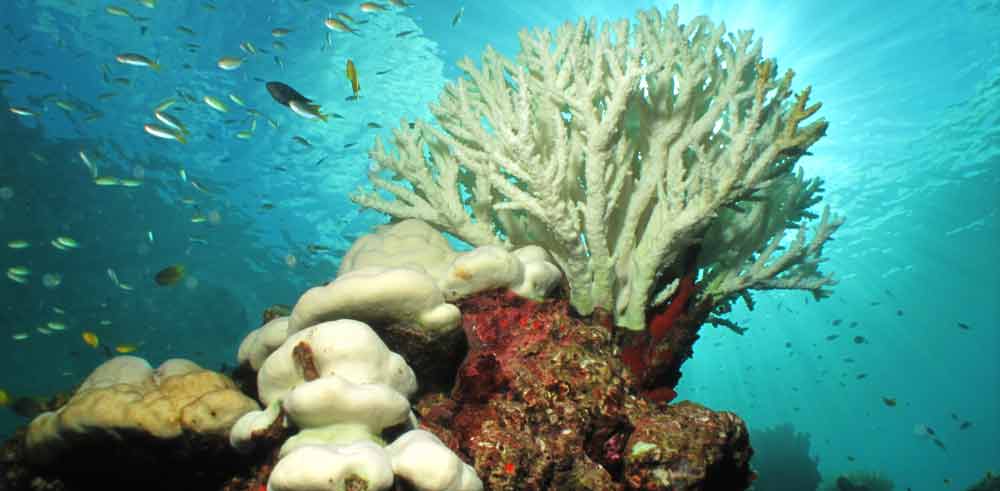Is Climate Change Destroying the Great Barrier Reef?

The Great Barrier Reef is the world’s largest coral reef system. It is located just off the coast of Queensland, Australia and is made up of nearly 3,000 individual reefs which can be seen from outer space. The Great Barrier Reef is also the world’s largest single structure made by living organisms, known as coral polyps.
The reef is a very popular tourist and fishing destination which has been experiencing damaging effects of climate change. Back to back coral bleaching events during last year (2016) have taken their toll on the reef, where two thirds of shallow water corals were lost in the north.
What is Coral Bleaching?
Coral bleaching is the process in which coral colonies lose their colour due to the loss of pigments created by microscopic algae living in the coral with their host organism, polyps. Bleaching takes place when water temperatures rise – when the water is warm the coral is under a lot of stress and destroys its algae which causes pigments in the coral to disappear meaning all colour is removed.
Scientist Concerns
Scientists are very concerned about these bleaching events as they have continued into 2017 and have a high chance of damaging the coral so drastically that it may never recover if there is no decrease in global temperatures. The sooner action takes place, the better.
Bleaching Events of 2017
The latest damage occurred without the assistance of El Niño, a weather pattern which was responsible for most of the bleaching that occurred last year. Around 800 individual reefs across 8,000km of the total length of the Great Barrier Reef have lost all their pigmentation as a result of bleaching caused by an increase in water temperatures.
Last year’s bleaching had a large effect mostly in the northern third of the reef, however, continuing into 2017 bleaching has spread further south and is now very intense in the middle section of the reef.
Combined with previous years of bleaching, reduced water quality caused by increased use of nutrients, pesticides and other pollutants on the land, and the explosion in population of crown-of-thorns starfish that feed on the flesh of the coral, 2017’s bleaching events have a very high chance of causing devastating effects to the great barrier reef.
Can Coral Recover?
If temperatures are to lower and normal conditions return, coral has the chance to recover but, it will take decades to get back to a healthy, vibrant state. However, if the stress is increased and temperatures are not managed, the coral will be unrecoverable and the Great Barrier Reef will only be found in history books.
2EA® are registered Low Carbon Energy Assessors, Consultants and ESOS Lead Assessors, offering both energy management and reduction services ranging from CCL/CHPQA Management to Energy Saving Opportunity Scheme (ESOS) and Carbon Reduction Commitment (CRC) consultancy.
For more information please contact us either by email to info@2ea.co.uk or by calling 01293 521 350.


